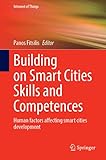Building on Smart Cities Skills and Competences [electronic resource] : Human factors affecting smart cities development /
Material type: TextSeries: Internet of Things, Technology, Communications and ComputingPublisher: Cham : Springer International Publishing : Imprint: Springer, 2022Edition: 1st ed. 2022Description: XVI, 334 p. 50 illus. in color. online resourceContent type:
TextSeries: Internet of Things, Technology, Communications and ComputingPublisher: Cham : Springer International Publishing : Imprint: Springer, 2022Edition: 1st ed. 2022Description: XVI, 334 p. 50 illus. in color. online resourceContent type: - text
- computer
- online resource
- 9783030978181
- 621.38 23
- TK7895.E42
- TK5105.8857
Part I. Skills and competences for smart cities’ development -- Chapter 1. Identifying emerging smart city job roles and skills to build a smart city workforce -- Chapter 2. The co-evolution of the digital transition and appropriate skills at city level -- Chapter 3. Preparing for Future Competences: trends arising through keyword and review analysis -- Chapter 4. Building Smart City Knowledge and Competences Using Problem-Based Learning in a Blended Learning Environment -- Part II. Strategy and Projects -- Chapter 5. The dynamic formation of a successful smart city roadmap -- Chapter 6. Sustainable Digital Transformation of Urban Landscape through Disruptive Technologies and Standards -- Chapter 7. Smart cities: Emerging risks and mitigation strategies -- Chapter 8. City Resilience and Intelligence – Interrelation and Reciprocity -- Chapter 9. Smart city projects evaluation: a bibliometric approach -- Chapter 10. Modelling Project Management Complexity in Smart Cities Projects -- Part III. Citizen engagement -- Chapter 11. Learning to engage citizens to make smarter cities. -- Chapter 12. Smart City Ambassadors develop skills and raise awareness in Oman -- Chapter 13. At the Root of the Smart Cities: Smart Learning Ecosystems to train Smart Citizens -- Chapter 14. Towards e-deliberation 2.0 -- Chapter 15. No-Code for Smart Cities -- Part IV. Smart cities innovative technologies -- Chapter 16. A Big Data Analytics Framework for A Smart City: A Case Study -- Chapter 17. RES-Q: Towards semantic interoperability for risk and disaster management in smart cities -- Chapter 18. Blockchain for Smart Cities: Findings from a Systematic Literature Review -- Chapter 19. Artificial Intelligence, Big Data Analytics and Smart Cities.
This book provides insights on skills required to achieve success in smart cities from a variety of industry and human factors perspectives. It emphasizes the balance between learning skills, technical skills, and domain-specific skills in these industries, with special emphasis given to innovative software development models. The authors note that digital transformation requires complementary measures that are not overtly aimed to support infrastructure investment but are instead directed at promoting entrepreneurship, improving digital skills, engaging citizens, applying new transformation strategies, and developing innovative software. All of the above are considered strategically important, especially for medium-sized cities since that enable them to be more competitive in the global economy. Presents insights on needed skills for achieving success in smart cities from a variety of industry perspectives; Focuses on the human factors side of smart cities, which is integral to successful applications; Includes the type of training that is needed to support modern smart ecosystems.


There are no comments on this title.